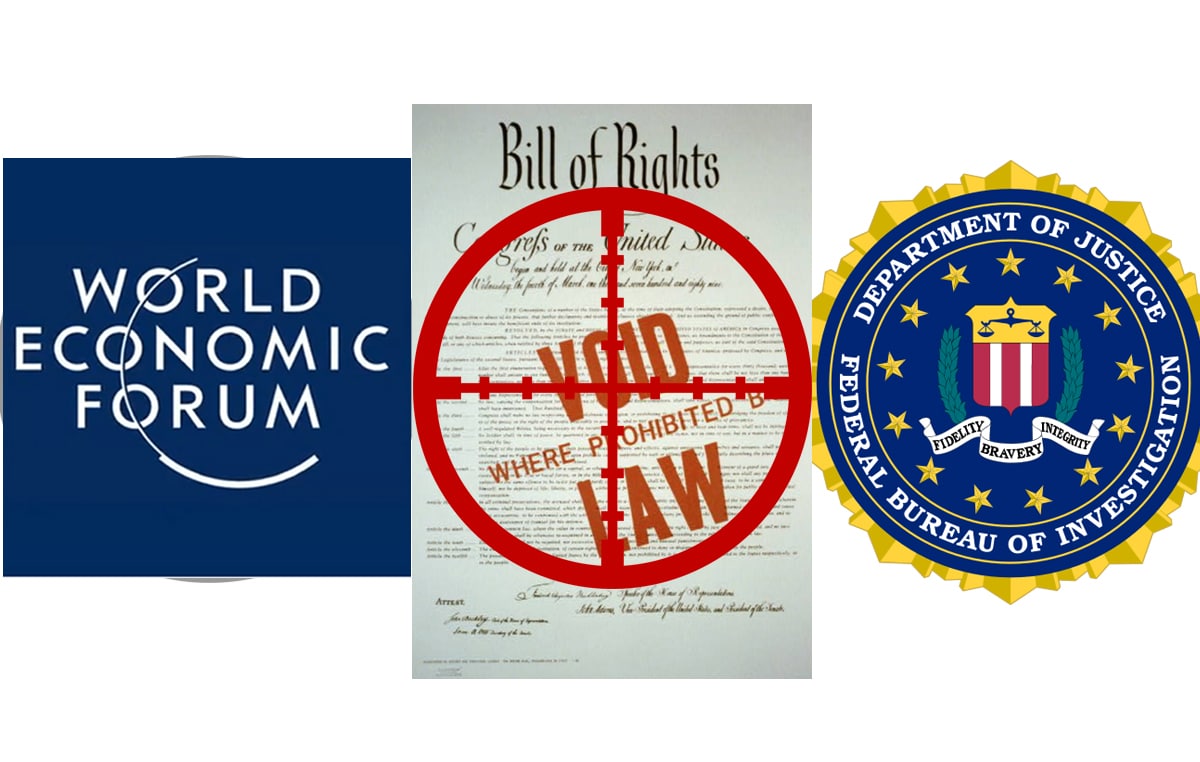You can judge an audience by how much bullshit they accept from the podium. By that standard, the World Economic Forum attendees in Davos, Switzerland last week were either depraved or craven. Why else would FBI chief Christopher Wray not get hooted down for portraying his agency as “good guys?”
Why was the FBI boss even making an appearance at a conference chockful of political weasels, billionaires, and depraved activists like former Vice President Al Gore? Actually, Wray was part of a panel on national security that included luminaries such as Ukrainian Vice-Prime Minister Yulia Svyrydenko, who could have offered insights from her government’s perpetual failed war against pervasive corruption. Wray boasted that “the level of collaboration between the private sector and the government, especially the FBI has, I think, made significant strides.”
A month before Wray’s appearance, Americans learned that “collaboration” meant the FBI massively censoring Twitter in recent years. As journalist Matt Taibbi revealed, “As the election approached in 2020, the FBI overwhelmed Twitter with requests, sending spreadsheets with hundreds of accounts.” The official browbeating continued until very recently. In an internal email from November 5, 2022, the FBI’s National Election Command Post sent the FBI San Francisco field office (which dealt directly with Twitter) “a long list of accounts that ‘may warrant additional action’”—i.e., suppression. The FBI pressured Twitter to torpedo parody accounts that only idiots or federal agents would not recognize as humor. Taibbi wrote, “The master-canine quality of the FBI’s relationship to Twitter comes through in this November 2022 email, in which ‘FBI San Francisco is notifying you’ it wants action on four accounts.”
The FBI condemned the TwitterFiles as “conspiracy theorists…feeding the American public misinformation with the sole purpose of attempting to discredit the agency.” But Taibbi and his colleagues didn’t fabricate the emails the FBI sent to Twitter.
On that Davos panel last week, Wray dramatically placed both hands on his chest and declared, “The good guys are constrained by the rule of law and international norms. The bad guys aren’t.” But that self-evident truth is tricky to reconcile with the history of FBI surveillance crime sprees.
In October 2001, the Patriot Act gave the FBI a green light to cannibalize the nation’s email with its Carnivore email wiretapping system. Carnivore was contained in a black box that the FBI compelled Internet service providers to attach to their operating system. Though Carnivore might be authorized for a single person, Carnivore could automatically impound the email of all the customers using that service. The ACLU’s Barry Steinhardt observed, “Carnivore is roughly equivalent to a wiretap capable of accessing the contents of the conversations of all of the phone company’s customers, with the ‘assurance’ that the FBI will record only conversations of the specified target.”
The Patriot Act authorized life sentences in prison for computer hackers who maliciously spread viruses but federal agents were exempt from the law. The FBI created a special program to send emails to individuals to infect their computers with malware that enabled keystroke monitoring and automatic detection of all passwords. Norton, McAfee, and other computer security firms secretly agreed to leave a backdoor for the FBI to exploit with no warning to computer users. James Dempsey of the Center for Democracy and Technology observed, “In order for the government to seize your diary or read your letters, they have to knock on your door with a search warrant. But [FBI malware] would allow them to seize these without notice.” The FBI also developed malware permitting it to covertly turn on a computer’s camcorder “without triggering the light that lets users know it is recording,” as The Washington Post reported in 2013.
The Patriot Act made it far easier for FBI agents to snatch personal data via National Security Letters (NSLs). These subpoenas compel individuals, businesses, and other institutions to surrender confidential or proprietary information that the FBI claims is related to a national security investigation. NSLs enable the FBI to seize records that reveal “where a person makes and spends money, with whom he lives and lived before, how much he gambles, what he buys online, what he pawns and borrows, where he travels, how he invests, what he searches for and reads on the Web, and who telephones or e-mails him at home and at work,” The Washington Post noted in 2005.
The number of NSLs increased by a hundredfold after 9/11. There is no judicial oversight of this power, and each FBI field office is entitled to dictate its own NSLs. Almost every NSL was accompanied by a gag order: Anyone who discloses that their data had been raided by the FBI could be sent to prison for five years.
By 2006, the FBI was issuing 50,000 NSLs a year. A single NSL can lasso thousands of people’s records, including all the clients of public libraries or book store customers. In 2007, an Inspector General report revealed that more than 10,000 NSLs may have violated federal law. Senate Majority Whip Richard Durbin (D-IL), declared that the IG report “confirms the American people’s worst fears about the Patriot Act.” Rather than arresting FBI agents who brazenly broke the law, FBI chief Robert Mueller created a new FBI Office of Integrity and Compliance.
But the FBI was just getting warmed up. In 1978, Congress passed the Foreign Intelligence Surveillance Act (FISA) to outlaw political spying (such as the FBI had committed) on American citizens. FISA created a secret court to oversee federal surveillance of suspected foreign agents within the U.S., permitting a much more lenient standard for wiretaps than the Constitution permitted for American citizens.
FISA warrants authorize the FBI to “conduct, simultaneous telephone, microphone, cell phone, e-mail and computer surveillance of the U.S. person target’s home, workplace and vehicles. Similar breadth is accorded the FBI in physical searches of the target’s residence, office, vehicles, computer, safe deposit box and U.S. mails,” a court decision noted. People surveilled under FISA orders rarely learn the feds have been intruding unless they are arrested as a result. And the FISA court rubberstamps 99.9% of all FBI search warrant requests.
The FISA court “created a secret body of law giving the National Security Agency the power to amass vast collections of data on Americans,” The New York Times reported in 2013 after Edward Snowden leaked court decisions. The court rubber-stamped FBI requests that bizarrely claimed that the telephone records of all Americans were “relevant” to a terrorism investigation under the Patriot Act, thereby enabling N.S.A. data seizures later denounced by a federal judge as “almost Orwellian.” In 2017, a FISA court decision included a 10-page litany of FBI violations, which “ranged from illegally sharing raw intelligence with unauthorized third parties to accessing intercepted attorney-client privileged communications without proper oversight.”
After the 2016 election, FBI officials devoted themselves to crippling Trump’s presidency with fabricated evidence on Russia collusion. Kevin Clinesmith, a top FBI lawyer, was convicted for falsifying evidence to secure a FISA warrant to unjustifiably target Trump campaign officials. A 2019 Inspector General report concluded that FBI officials made 17 “significant inaccuracies and omissions” in its application to the FISA court to spy on former Trump advisor Carter Page. The FBI withheld details from the court that would have crippled the credibility of the warrant request.
In 2021, a FISA court report revealed that the FBI has conducted warrantless searches of a massive data trove compiled by the National Security Agency for “public corruption and bribery,” “health care fraud,” and other targets—including people who notified the FBI of crimes and even repairmen entering FBI offices. Even people who volunteered for the FBI “Citizens Academy” program were illegally tracked by the FBI. In 2019, an FBI agent conducted an unjustified database search “using the identifiers of about 16,000 people, even though only seven of them had connections to an investigation,” The New York Times reported. In 2021, the FBI carried out more than 3 million warrantless searches on U.S. persons, according to data revealed in early 2022.
Maybe FBI boss Wray believes that the Fourth Amendment’s prohibition of unreasonable warrantless searches doesn’t apply to “good guys.” The audience in Switzerland might have cheered him for making that assertion. Has the World Economic Forum ever seen a government surveillance scheme that it didn’t like?
Instead of swallowing Wray’s piffle, Americans should heed former FBI chief James Comey. In 2015, Comey told a congressional committee: “You should not trust me…because you cannot trust people with power.” President Trump followed that advice and fired Comey two years later. But Comey’s point remains a better lodestar for judging the FBI than the hokum currently prevailing in the mainstream media, on Capitol Hill, or at scheming Swiss confabs.

































